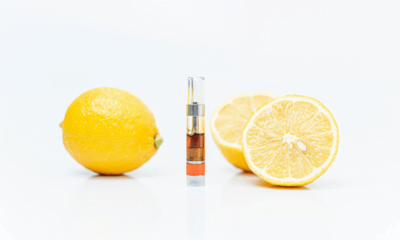With some research suggesting it helps reduce nicotine cravings, is CBD the key to kicking the habit for good?
Smoking kills – more than eight million people a year to be precise, according to the World Health Organisation (WHO).
In the UK alone, the NHS estimates around 78,000 people die from preventable deaths caused by smoking, with many more living with debilitating smoking-related illnesses.
If there was ever any doubt, the outbreak of Covid-19 – a respiratory virus which causes breathlessness and a persistent cough as two of its most common symptoms (just in case you’ve been living under a rock this year) – has exposed the risks smokers are leaving themselves open to.
An analysis by the WHO earlier this year found smokers are more likely to develop severe disease from COVID-19 than non-smokers, while Public Health England has suggested smoking is a significant predictor of disease severity, with smokers 14 times more likely to develop severe respiratory disease.
But as anyone who has tried to kick the habit will know, it’s easier said than done.
Can CBD help?
Findings published earlier this year by The Cannabis Radar, suggested, not for the first time, that CBD could be the solution.
The results, from a 700-person survey in the US showed that almost half of participants were able to abstain from cigarettes by using cannabidiol.
Participants were asked to inhale or consume CBD whenever they felt the urge to smoke, with 42 percent reporting that they were able to abstain from cigarettes for a month.
While there is plenty of anecdotal evidence, the scientific research into CBD’s effect on tobacco addiction is limited – but still promising.
A 2013 report explored the effects of replacing cigarettes with CBD in a week-long study. The results revealed that those participants given a CBD inhaler to use every time they felt the need to smoke, reduced their number of cigarettes by 40 percent.
As Matt Picken, of 7CBD explained, most smokers are addicted to the chemical nicotine. This triggers the release of the feel-good hormone dopamine in the brain and is to blame for cigarettes being so addictive.
It is thought that CBD can actually reduce nicotine cravings by rebalancing the body’s endocannabinoid system (ECS).
Consuming CBD kickstarts the ECS and produces endocannabinoids anandamide (AEA) and 2-AG, says Matt, which naturally increase dopamine levels and reduce the cravings of dopamine spikes caused by nicotine.
What do the experts say?
“In very simplistic terms, CBD works by helping to bring the body back into balance,” said Ruby Deevoy, a CBD and cannabis journalist who has covered its effect on smoking extensively.
“Addiction, of any sort, throws your body out of balance in lots of different ways – emotionally, physically and mentally. The hope is that CBD can help with that.”
CBD is also thought to regulate cortisol release, the hormone produced by the body in response to stress, and could be helpful in reducing ‘stress-induced relapses’ which lead smokers to reach for the cigarettes, according to Ruby.
“The CBD molecule directly activates serotonin, opioid and dopamine receptors all of which play an important role in altered neuronal function and behaviour which goes hand in hand with addiction,” she continued.
“Numerous studies have shown that CBD holds great potential when it comes to quitting addictive substances, with research into cigarettes, alcoholism and other drugs yielding positive results. There’s still a long way to go in understanding why this is, so there are no official answers yet, but there are some good theories that are being investigated further.”
Dean Billington, chief scientific officer at BRAINS bioceuticals, one of the few companies in the world producing CBD as an Active Pharmaceutical Ingredient (API), also told Cannabis Health there are several indications that CBD could be effective in smoking, alcohol and even opioid cessation.
“It’s all at the very early stages but there are some interesting results coming out of some of the studies that are being conducted,” he said.
“What we know is that CBD reduces your levels of anxiety and stress, and therefore, perhaps reduces the need to subsequently take a cigarette.
“There is also some evidence that CBD can be used in alcohol cessation and as a mechanism to wean people off opiates, in areas where it is of particular interest, such as in the US where opiate addiction is a huge challenge.”
One of the significant benefits of using CBD to manage addiction, is that it is non-addictive itself, with no evidence that it causes any side effects, continued Dean.
“There’s no evidence to show that CBD taken in any level of concentration is addictive, or indeed that it has any side effects, or that anybody has ever overdosed on CBD,” he added.
“When you reach a plateau, as you continue to increase the concentration of CBD, it actually starts to take less effect.”
A safer alternative?
For those still tackling cravings, CBD brand V&YOU has recently brought out its own range of Nicotine Pouches to offer smokers and vapers a safer way to get a hit, while they try to curb the habit.
The pouches, which are billed as a less harmful alternative to smoking, consist of a small cellulose bag filled with cotton fibre, flavour and nicotine, which can be placed between the lip and your gum for up to 30 minutes.
V&YOU founders believe they could play a significant role in helping people quit, in the same way that snus has – a moist, powder, smokeless tobacco product which originated in Sweden.
Co-founder & CEO Titus Wouda Kuipers said: “V&YOU Nicotine Pouches are aimed at people who already use nicotine in vapes or cigarettes and are generally seen as a less harmful alternative to smoking. This is the biggest driver for smokers looking to quit smoking, all of whom will know the health risks associated with the habit.”
According to Karl Erik Lund, PH.D, research director of the Norwegian Institute for Alcohol and Drug Research, snus has become the most popular smoking cessation method among smokers in Norway.
Titus added: “In the same way as snus – which is estimated to be more than 95 percent less harmful than smoking – nicotine pouches could play a key role in helping smokers to quit the habit.”

 News6 months ago
News6 months ago
 News6 months ago
News6 months ago
 Science5 months ago
Science5 months ago
 Industry6 months ago
Industry6 months ago
 News6 months ago
News6 months ago
 News5 months ago
News5 months ago
 Health4 months ago
Health4 months ago
 News5 months ago
News5 months ago












